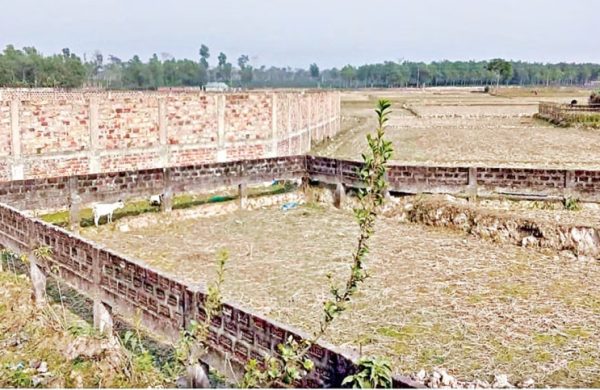Business owners face hostile environment
- Update Time : Sunday, November 10, 2024

News Desk
The Bangladesh Bank (BB) and its Financial Intelligence Unit (BFIU) have clarified that they cannot appoint a receiver for any business without following a lengthy and established procedure.
Despite recent media reports citing BFIU, claiming that receivers have been appointed for several companies, both institutions have denied taking such actions, emphasising that no such decisions have been made at this time.
“A receiver had been appointed by the court for a business group. However, due to a writ petition, the process is currently on hold. Further inquiries are being conducted into some other companies. But no decision has been made regarding the appointment of a receiver for any other companies. BFIU has no authority to make such decisions,” BFIU deputy head AKM Ehsan said.
“If the court orders a receiver, we will follow through. But there is no scope for any action before that,” he added.
A senior BFIU official explained that at least five steps must be followed before a receiver can be appointed. “These steps include identifying accounts suspected of being involved in money laundering, summoning or seizing suspicious accounts, tracing transactions to detect money laundering, sending findings to the Anti-Corruption Commission (ACC) or CID, filing cases in court through these bodies, and finally appointing a receiver to seize domestic assets or pursue legal action abroad to recover the money.”
“To date, investigations into money laundering have only been completed for S. Alam Group and former Land Minister Saifuzzaman Jabed, and no action has been taken against any other company. The government has appointed a lawyer to bring back the assets allegedly laundered by Saifuzzaman Jabed,” the official added.
Central bank spokesperson Husne Ara Shikha said, “BB has clarified that it will not appoint a receiver or administrator for any company on its own initiative. However, if directed by the High Court, it will comply with the court’s order.”
She further said, “To appoint a receiver, a court order is required. So far, the High Court has directed the appointment of a receiver for one industrial group. The central bank is following the legal process accordingly. BB will not appoint a receiver on its own for any other industrial group or company.”
According to Article 31 of the Constitution of Bangladesh, no illegal action can be taken that could harm a person’s life, reputation, or property. Moreover, a person cannot be deemed a criminal unless proven guilty. The ongoing media trial involving top business owners, industrialists, investors and financial institutions has caused widespread panic among the general public. Many people are withdrawing deposits from banks and financial institutions. The media trial has also led to instability in several business sectors, with a loss of trust in business institutions.
Mohammad Hatem, president of the Bangladesh Knitwear Manufacturers and Exporters Association (BKMEA), said, “During the previous government, wrong policies were made due to the dissemination of false information. In the export sector, we were wronged with incorrect or false news. We urge everyone to adhere to journalistic principles to end media trials.”
Anwar-ul Alam Chowdhury (Parvez), president of the Bangladesh Chamber of Industries (BCI) and chairman of Evince Group, said “Ensuring the free flow of accurate information is crucial. Under the previous government, erroneous data on inflation, GDP, and population had a negative impact on policymaking. We must ensure the proper dissemination of accurate information, free from misinformation.”
Bangladesh Bank has already taken steps to recover laundered funds. This is good news for most business owners, as 98% are not involved in money laundering. If the offenders are caught, many business owners would be relieved. However, attention must be paid to prevent the country’s industries from being destroyed due to wrong policies or misinformation, as once an industry is established, it becomes a national asset,” he added.
Abdul Awal Mintoo, former president of the Federation of Bangladesh Chambers of Commerce and Industry (FBCCI), said, “The ones creating employment through investment are being victimised. Investment is crucial for creating jobs, but the investment environment in the country is not conducive. Investors are now facing multiple challenges.”
Mir Nasir Hossain, former president of FBCCI, said, “Bank interest rates have risen from 9% to 14-15%. In this situation, it is difficult to maintain a business with such high interest. Additionally, new regulations state that a borrower will be declared a defaulter if they miss payments for 90 days, and we are worried about this. Along with rising interest rates, there is a lack of proper energy supply to meet demand.”
After the ousting of the prime minister Sheikh Hasina, the government restructured the Inter-Agency Task Force on 29 September to recover assets laundered abroad and manage them. The task force is chaired by the Governor of Bangladesh Bank, with the BFIU providing administrative support.”
Data shows that operational costs in business enterprises have increased by 30% due to the current economic situation. Bank interest rates have increased to over 15%, and the price of the dollar has surged by almost 41%, resulting in a 30% decrease in imports. Consequently, industrial production has contracted, transportation costs have risen, and the import of raw materials has become more expensive.
Entrepreneurs said that incorrect policies and circulars issued by various regulatory bodies have led many entrepreneurs to become loan defaulters. Therefore, there is a growing call for prioritising long-term policy support for those who have defaulted due to government policies rather than voluntary defaults. Without such support, the country may face prolonged stagnation in employment and economic activities.
Advisors to the government on recovering laundered funds have issued strong warnings, seeking international cooperation and assistance from foreign diplomats to bring back the laundered assets.
Additionally, the Bangladesh Financial Intelligence Unit (BFIU) has started sending letters to different countries to gather information about the financial assets of certain individuals and entities. The CID, Narcotics Control Department, National Board of Revenue (NBR), Customs, Environmental Department, BSEC and ACC are all working to prevent and control money laundering.
Since the new governor of Bangladesh Bank, Dr Ahsan H Mansur, assumed office, the BFIU has suspended the bank accounts of several large industrial group owners, including S Alam Group and Beximco, along with the accounts of their family members. Source: Kaler Kantho


















